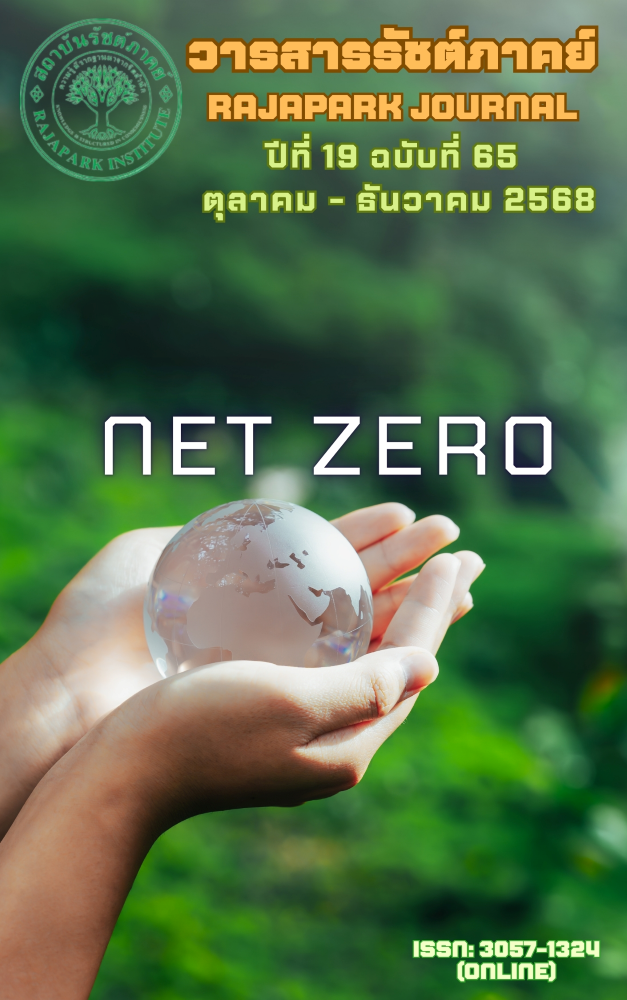ISSN: 3057-1324 (Online)
วารสารรัชต์ภาคย์ (Rajapark Journal) เป็นวารสารวิชาการในเครือสถาบันรัชต์ภาคย์ ได้รับการรับรองคุณภาพวารสารวิชาการจากศูนย์ดัชนีการอ้างอิงวารสารไทย Thai-Journal Citation Index Center: TCI เป็นวารสารกลุ่มที่ 2 (สาขามนุษยศาสตร์และสังคมศาสตร์) ระหว่างปี 2568-2572 วารสารมีความมุ่งมั่นส่งเสริมการศึกษาค้นคว้าวิจัยสร้างองค์ความรู้ใหม่ และเผยแพร่บทความที่มีคุณภาพของนักวิชาการ นักวิจัย และนิสิต นักศึกษาทั้งภายในและภายนอกสถาบัน ครอบคลุมสาขารัฐศาสตร์ รัฐประศาสนศาสตร์ เศรษฐศาสตร์ นิติศาสตร์ บริหารการศึกษา บริหารธุรกิจ บัญชี การจัดการ การท่องเที่ยว ศิลปศาสตร์ และศิลปวัฒนธรรมสร้างสรรค์ โดยเปิดรับบทความวิจัยและบทความวิชาการ ทั้งภาษาไทยและภาษาอังกฤษ ทุกบทความผ่านการพิจารณาคุณภาพจากผู้ทรงคุณวุฒิ (double-blind peer review) จำนวน 3 ท่าน ซึ่งมีความเชี่ยวชาญในสาขาที่เกี่ยวข้องและมาจากหลากหลายสถาบัน โดยมิได้เป็นสถาบันเดียวกันกับเจ้าของบทความ และดำเนินงานตามหลักจริยธรรมและจรรยาบรรณวารสารวิชาการไทย
Vol. 19 No. 65 (2025): October - December

บทบรรณาธิการ
วารสารรัชต์ภาคย์ (Rajapark Journal) ปีที่ 19 ฉบับที่ 65 ตุลาคม – ธันวาคม 2568 เป็นวารสารวิชาการในเครือสถาบันรัชต์ภาคย์ ได้รับการรับรองคุณภาพวารสารวิชาการจากศูนย์ดัชนีการอ้างอิงวารสารไทย Thai-Journal Citation Index Center: TCI เป็นวารสารกลุ่มที่ 2 (สาขามนุษยศาสตร์และสังคมศาสตร์) ระหว่างปี พ.ศ. 2568-2572
ท่ามกลางพลวัตของความสัมพันธ์ระหว่างประเทศในภูมิภาคเอเชียตะวันออกเฉียงใต้ ประเด็นความมั่นคงตามแนวชายแดนยังคงเป็นหัวข้อท้าทายที่ต้องการองค์ความรู้และแนวทางในการจัดการที่เฉียบคม โดยเฉพาะอย่างยิ่งในบริบทความสัมพันธ์ไทย-กัมพูชา ซึ่งแม้จะมีความร่วมมือทางเศรษฐกิจ แต่ก็ยังแฝงไปด้วยปัญหาอาชญากรรมข้ามชาติที่ส่งผลกระทบต่อเสถียรภาพและความมั่นคงของทั้งสองประเทศ สถานการณ์ความตึงเครียดที่เกิดขึ้นเป็นระยะตามแนวชายแดนในปี พ.ศ. 2568 ได้สะท้อนให้เห็นถึงความเปราะบางของความสัมพันธ์ และตอกย้ำถึงความจำเป็นในการบริหารจัดการปัญหาแรงงานข้ามชาติ ซึ่งเป็นทั้งกลไกขับเคลื่อนเศรษฐกิจและชนวนของความขัดแย้ง
ในฉบับนี้ กองบรรณาธิการมีความยินดีอย่างยิ่งที่จะนำเสนอบทความวิชาการเรื่องเด่นของ อติชาต แย้มผกา ว่าด้วย “แนวทางป้องกันและปราบปรามการลักลอบขนแรงงานข้ามชาติในประเทศไทย” ซึ่งนับเป็นการหยิบยกประเด็นปัญหาที่สำคัญและเร่งด่วนมาวิเคราะห์ได้อย่างลึกซึ้งและทันต่อสถานการณ์ บทความนี้ไม่ได้เป็นเพียงการรวบรวมข้อมูลสถานการณ์ แต่เป็นการเจาะลึกถึงลักษณะของขบวนการลักลอบขนแรงงานข้ามชาติที่มีการทำงานอย่างเป็นเครือข่าย และได้นำเสนอพิมพ์เขียวสำหรับการแก้ไขปัญหาเชิงบูรณาการ โดยใช้ ทฤษฎีสามเหลี่ยมอาชญากรรม (Crime Triangle Theory) มาเป็นกรอบในการวิเคราะห์ เพื่อเสนอแนวทางตัดวงจรอาชญากรรมตั้งแต่ต้นทาง ทั้งในมิติของผู้กระทำผิด (Offender), เหยื่อ (Victim) และ โอกาส (Opportunity)
ข้อค้นพบจากบทความนี้มีความสำคัญอย่างยิ่งต่อการกำหนดนโยบายในปัจจุบัน เพราะได้ชี้ให้เห็นว่าการแก้ไขปัญหาแรงงานข้ามชาติที่หลบหนีเข้าเมืองต้องอาศัยแนวทางที่หลากหลายและครอบคลุม ตั้งแต่การบังคับใช้กฎหมายที่เข้มงวด การเพิ่มบทลงโทษนายจ้างที่กระทำผิด ไปจนถึงมาตรการเชิงรุกในการจัดตั้งจุดตรวจ-จุดสกัดตามแนวชายแดน และที่สำคัญคือการส่งเสริมให้แรงงานข้ามชาติเข้าสู่ระบบการจ้างงานที่ถูกต้องตามกฎหมาย ซึ่งสอดคล้องกับความพยายามของรัฐบาลในการสร้างสมดุลระหว่างมิติความมั่นคงของชาติ ผลประโยชน์ทางเศรษฐกิจ และหลักสิทธิมนุษยชน ข้อเสนอดังกล่าวจึงเป็นเสียงสะท้อนไปยังหน่วยงานภาครัฐว่า การแก้ไขปัญหาที่ยั่งยืนจำเป็นต้องอาศัยความร่วมมือจากทุกภาคส่วน และต้องดำเนินนโยบายที่สร้างความเชื่อมั่นให้แก่ทั้งผู้ประกอบการและแรงงานข้ามชาติ เพื่อป้องกันไม่ให้ปัญหาบานปลายจนส่งผลกระทบต่อความสัมพันธ์อันดีในระดับมหภาค
กองบรรณาธิการวารสารรัชต์ภาคย์ หวังเป็นอย่างยิ่งว่า บทความวิชาการในฉบับนี้จะช่วยจุดประกายแนวคิดและเป็นประโยชน์ต่อการพัฒนานโยบายสาธารณะ พร้อมทั้งขอสนับสนุนนักวิชาการและนักวิจัยทุกท่าน ในการสร้างสรรค์ผลงานที่มีคุณค่าเพื่อขับเคลื่อนสังคมและประเทศชาติต่อไป
ดร. ธันยนันท์ จันทร์ทรงพล
บรรณาธิการ
Published:
2025-10-12
View All Issues


